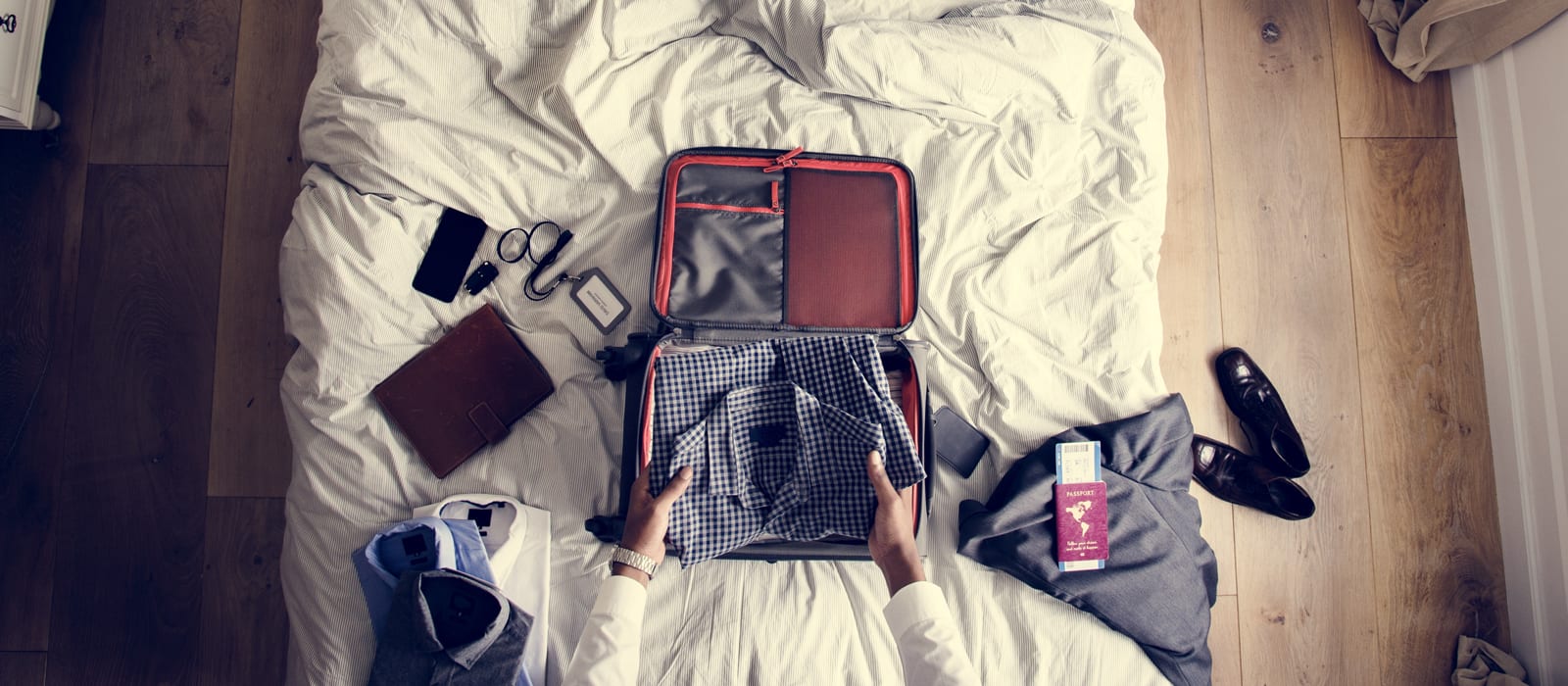What to Pack for Rehab
 Sarah Shawaker
Sarah Shawaker Sarah Shawaker
Sarah Shawaker
 Sarah Shawaker
Sarah Shawaker Sarah Shawaker
Sarah Shawaker- Pack essential clothes, toiletries, and documents.
- Your care team will help you manage medications.
- Bring a comfort item or memento.
As you prepare to enter treatment, you can use this packing list to ensure you have all the necessary items to help you begin your recovery journey. The treatment center may provide a packing list that you can cross-reference, and be sure to adhere to any guidelines they may have.
The Essentials
Clothing Essentials
You will want to bring clothing that is comfortable, casual, and weather appropriate. Depending on the treatment center’s location, you may want to pack a variety of clothing items that account for temperature changes during the day and night. Be sure to include:
- Tshirts
- Long sleeve shirts
- Shorts
- Pants
- Sleepwear
- Undergarments
- Socks
In treatment, dress should be modest and respectful. Pack items you feel comfortable wearing, and check the center’s dress code.
Toiletries and Personal Care Items
Some centers may provide a general array of toiletries, including shampoo, soap, conditioner, and toothpaste. But others won’t, so make sure you check to see what they’ll provide. Usually, you can expect to bring:
- Toothbrush and toothpaste
- Shampoo and conditioner
- Soap
- Deodorant
- Hairbrush
- Feminine hygiene products
- Moisturizer
Try to bring an appropriate amount of product for your program length. If you’re attending a long-term program, ask your admissions coordinator if restocks can be arranged.
Some centers may not allow certain personal care products, such as shaving razors or products with alcohol (like mouthwash or germ killer). Be sure to ask the admissions team about what is allowed.
Comfortable Footwear
Consider packing footwear for both indoor and outdoor activities. Aside from a comfortable pair of shoes for day-to-day groups, check out the center’s schedule and amenities to see if you’ll need additional shoes to participate in certain activities. For example, if the treatment center has a basketball court, you may want to bring sturdy athletic shoes. If you will go on beach excursions, pack water shoes.
Medications and Prescriptions
Having proper medication can be an important part of recovery. Your care team will discuss your current medications and medical information to see if medications may be a good fit for you. They can work with you to store medication and give it to you at the correct time.
Throughout treatment, you may be prescribed new medications. If this happens, it’s very important that the team is aware of any medical conditions you have to avoid negative medication reactions.
Be sure to double check with the admissions team if you can bring your digestive aids, allergy medication, vitamins, and supplements.
Important Documents
You’ll want to bring several important documents to treatment:
- Passport or official personal identification
- Insurance card
- All current prescription medications, carried in their original, properly labeled pharmacy containers
- A contact list of anyone you want to keep informed on the progress of your treatment
- A credit card, debit card and/or checkbook
- Enough cash to cover general store purchases and other incidental expenses
Organizing and printing all papers beforehand will help make the transition to treatment less stressful.
The “Nice to Haves”
Comfort Items and Mementos
Having something that reminds you of home can make you feel a little more comfortable throughout your recovery process. This might be a picture, blanket, stuffed animal, or a loved one’s gift. These can provide emotional support.
Be sure to wisely choose your comfort items, as the program likely will not allow you to bring an excessive amount.
Reading and Writing Materials
Throughout your recovery journey, you may discover that reading and writing can help you express and process your feelings. Bringing a book and journal to write in offers an opportunity to reflect in your downtime. In fact, reading and writing can reduce stress and ease depression symptoms1.
You may choose to read self-help books such as The Mountain Is You2 and Atomic Habits3. If you’re attending mental health treatment, The Body Keeps the Score4 could educate your journey. A gratitude journal or a journal with prewritten reflection prompts such as Dig Deeper5 could aid self-discovery in this monumental period of growth.
Fitness and Outdoor Gear
Good physical health plays a key role in successful addiction and mental health recovery. Exercise improves cardiovascular health, brain health, and immune system functioning, as well as reduces anxiety and depression symptoms6. The treatment center might provide physical activities to boost your well-being, so consider packing:
- Athletic shoes
- Fitness clothes
- Sunscreen
- Bug spray
- Personal equipment (if the facility has a tennis court, ask the admissions team if you can bring your racquet)
Electronics and Entertainment
Discuss the electronic policy with your admissions team before attending treatment. Some facilities will allow you to bring your phone and laptop to attend to work responsibilities during designated times. Other centers may keep your phone stored away during the day and allow you to use it after program hours. It’s possible the facility might have a strict no-electronics policy.
Many centers allow devices that just play music, such as an iPod. You can then bring headphones to listen to your music.
If you’re attending a program with little to no electronic time, be sure to let loved ones know ahead of time. Centers will typically have a phone for patients to use.
Whether or not you can bring your phone, laptop, or tablet, the focus of treatment is to heal. The majority of your time will be spent in therapy and activities to assist your recovery journey.
Snacks and Non-Alcoholic Beverages
Proper nutrition and hydration helps keep your mind and body ready to heal in treatment. The center will tell you what meals are provided, what meals you have to cook, and what foods you need to buy while there. Some centers might allow you to bring some of your favorite nonperishable snacks, such as pretzels, granola, and fruit bars. Check with the admissions coordinator to see if this is an option.
Explore Residential Treatment Centers
What Not to Pack for Rehab
When planning for your stay in treatment, it’s also important to understand what’s generally not allowed in rehab:
- All forms of drugs and alcohol
- Prescription medications that are not a part of your approved treatment plan
- Medications prescribed to another person
- Pornography
- Guns, knives, and other weapons
- Opened, non-prescription medications
- Alcohol-containing mouthwash, perfumes, or colognes
- Nail polish and nail polish remover
Be sure to check with the treatment center if any other items are prohibited.
-
Mugerwa, S., & Holden, J. D. (2012). Writing therapy: A new tool for general practice? The British Journal of General Practice, 62(605), 661–663. https://www.ncbi.nlm.nih.gov/pmc/articles/PMC3505408/
-
Brianna Wiest. (2020). The Mountain is You: Transforming Self-Sabotage Into Self-Mastery. Unabridged Thought Catalog Books.
-
Clear, J. (2018). Atomic habits: tiny changes, remarkable results : an easy & proven way to build good habits & break bad ones. New York, New York, Avery, an imprint of Penguin Random House.
-
Van der Kolk, B. A. (2015). The body keeps the score: brain, mind, and body in the healing of trauma. New York, New York, Penguin Books.
-
Dig deeper journal by inside then out. (n.d.). Awe Inspired. Retrieved January 2, 2024, from https://aweinspired.com/products/dig-deeper-journal
-
https://www.cdc.gov/physical-activity-basics/benefits/?CDC_AAref_Val=https://www.cdc.gov/physicalactivity/basics/pa-health/index.htm
Our Promise
How Is Recovery.com Different?
We believe everyone deserves access to accurate, unbiased information about mental health and recovery. That’s why we have a comprehensive set of treatment providers and don't charge for inclusion. Any center that meets our criteria can list for free. We do not and have never accepted fees for referring someone to a particular center. Providers who advertise with us must be verified by our Research Team and we clearly mark their status as advertisers.







